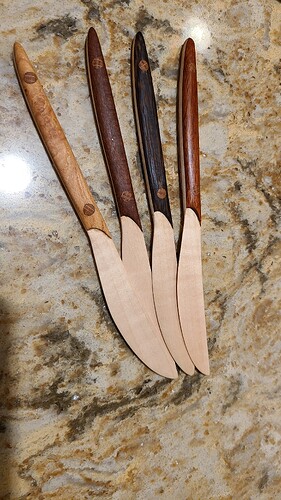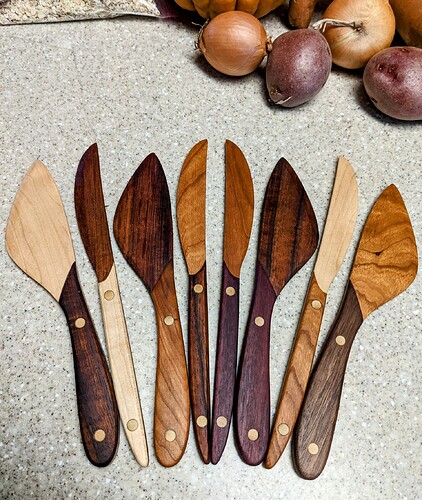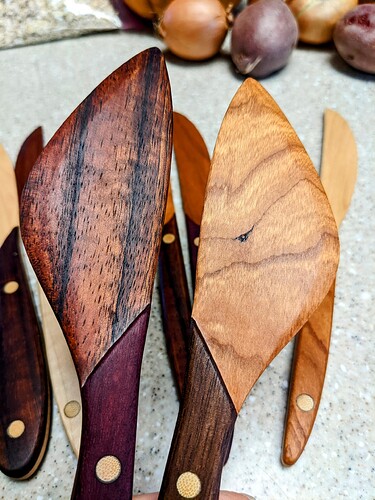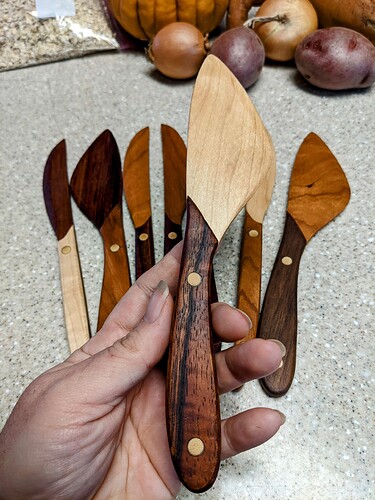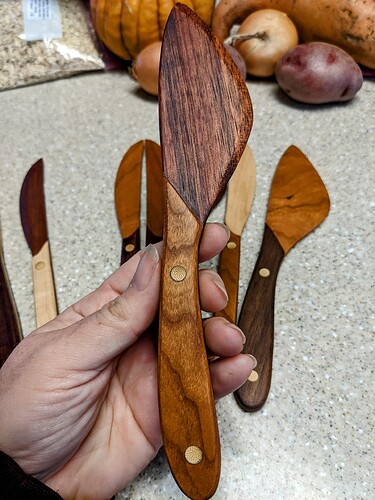My take:
That looks amazing, love the inlay! Wow!
For family Christmas this year we are to give “one of our favorite things” in white elephant type gift exchange. So I had to make a few butterknives to give away. ![]()
Thank you again for great pattern.
You are most welcome! Thanks for sharing, glad to hear it is of use and interest to everyone! Merry Christmas!
Beautiful, and they work. I’d be thrilled if a white elephant like that showed up in my mailbox!
I made some too for Christmas gifts this year. Thank you so much for the files!
These are a mix of maple, cherry, walnut, purple heart, and koa.
Those came out absolutely beautiful! Thanks for sharing! So awesome to see what people have created from these!
So flippin’ awesome!
Those are terrific.
Who wouldn’t want to receive a gift like this? These are beautiful. Well done.
How did you finish them?
I’ve never tried it, but it’s hard to go wrong with linseed oil and beeswax ![]()
Or mineral oil and beeswax. Any butcher block table oil or cutting board oil works well too.
I usually have a myriad of cutting board oils/waxes lying around (my keep-under-the-kitchen-sink-stuff is Howard Butcher Block conditioner: Amazon.com), so I give them an update, or a soak in a mineral oil bath every once in a while to maintain.
For folks that haven’t worked with it, it’s worth noting that while raw linseed oil is food-safe, boiled linseed oil is not.
I cook up batches of board balm with mineral oil and beeswax about once a year - I include small jars with cutting boards and the like. Items with deep engraving just get mineral oil as needed.
I couldn’t make it to the store, so I used what I had on hand - a mix of coconut oil and beeswax. The only liquid coconut oil I had was raspberry flavoured, so these smell like raspberries now ![]()
That would make an unusual gift to a host: loaf of bread, custom engraved tray, cream cheese, fruit jam, and a wooden knife that smells like the fruit. (I don’t recommend making the loaf of bread in the GF, although there are stories of gingerbread…)
![]()
Thanks for the compliments guys! My only regret with them…I didn’t make enough…for me. I don’t get any of these ones. I’ll be designing a few of my own next batch as well. I love wooden kitchen things!
Wanting to join in the fun, I asked ChatGPT about food-safety of the woods sold on ocoochhardwoods.com.
| Wood Type | Safe for Blade? | Safe for Handle? | Notes | PPE Required for Shaping | Laser Cutting Safety |
|---|---|---|---|---|---|
| Alder | Suitable for light-duty use; soft for heavy-duty applications. | None | |||
| Ash | Good durability; traditional utensil wood. | None | |||
| Aspen | Very soft; not recommended for durability in blade or handle. | None | |||
| Basswood | Very soft; not recommended for long-term durability. | None | |||
| Beech | Excellent choice; traditionally used for kitchen items. | None | |||
| Black Limba | Dust can cause skin irritation; better for handles only. | Mask, gloves | |||
| Bloodwood | Contains irritants; unsuitable for food contact. | Mask, gloves | |||
| Bubinga | Can cause skin and respiratory irritation; use for handles only. | Mask, gloves | |||
| Butternut | Softer than walnut but food-safe. | None | |||
| Bolivian Rosewood | Contains oils that can leach; avoid for food contact. | Mask, gloves | |||
| Cherry | Excellent choice; naturally food-safe. | None | |||
| Curly Maple | Excellent choice; decorative and food-safe. | None | |||
| Canarywood | Known skin irritant; avoid food contact. | Mask, gloves | |||
| Hard Maple | Excellent choice; top tier for food contact. | None | |||
| Koa | Food-safe and durable; prized for its beauty and workability. | None | |||
| Leopardwood | Potential irritant; handle only. | Mask, gloves | |||
| Mahogany | Some species are safer (e.g., Honduran Mahogany); research and seal properly. | Mask | |||
| Padauk | Can cause reactions; use for handles only. | Mask, gloves | |||
| Poplar | Safe but soft; may not be durable. | None | |||
| Purpleheart | Contains alkaloids; use for handles only. | Mask, gloves | |||
| Red Cedar | Oils can leach and affect taste; avoid entirely. | Mask | |||
| Red Oak | Open pores absorb food particles and harbor bacteria; not ideal. | None | |||
| Tigerwood | Known irritant; handle only. | Mask, gloves | |||
| Walnut | Excellent choice; watch for nut allergies in gifted items. | None | |||
| White Limba | Similar to Black Limba; better for handles. | Mask, gloves | |||
| White Oak | Better than Red Oak due to closed pores. | None | |||
| Wenge | Toxic splinters and irritants; handle only. | Mask, gloves | |||
| Yellowheart | Limited data on food safety; use with caution. | Mask | |||
| Zebrawood | Known skin irritant; handle only. | Mask, gloves |
Key recommendations for blades:
- Best choices: Hard Maple, Beech, Cherry, Walnut, White Oak
- Always seal wood properly with food-safe finish
- When in doubt, stick with traditional food-safe hardwoods
Key recommendations for handles:
- Most woods are safe for handles when properly sealed
- Exotic woods can add beautiful contrast to simple maple/beech blades
- Consider allergies/sensitivities for gifted items
What a fantastic list (and use of Chat GPT)!
